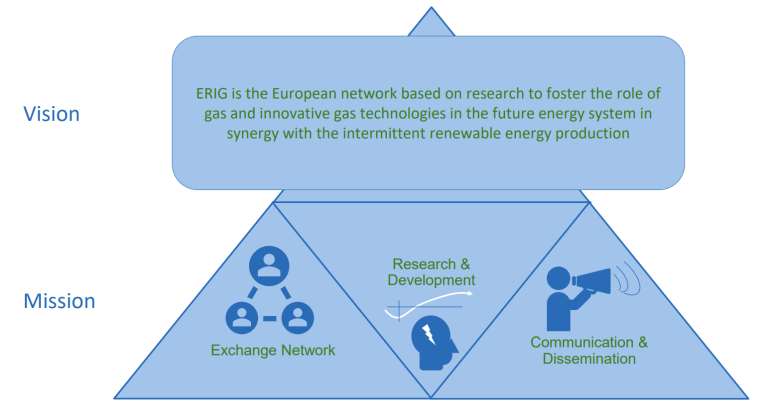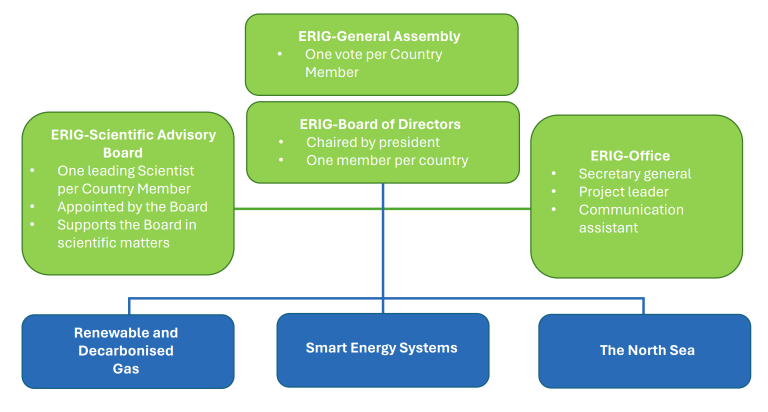About ERIG
European Research Institute for Gas and Energy Innovation (ERIG a.i.s.b.l.) is an European research and development organisation. It pursues the vision to foster the role of gas and innovative gas technologies in the future energy system in synergy with the intermittent renewable energy production as an European network based on research.
Why ERIG
EU climate and energy policy is committed to reduce net emissions to zero by 2050 and encourage economic growth decoupled from resource use. Thereby also leaving no person nor place behind.
Innovative approaches in terms of technical reliability, economic sustainability and safety are called for to achieve these goals. Within the overall structure of a sustainable energy supply system, it is clear that an integrated systemic approach for the future energy system will be needed.
Gas and the gas infrastructure can play a major role in the future energy system.
Natural gas is the fossil fuel with the lowest specific carbon dioxide emissions. The highly flexible gas transport and distribution system along with innovative gas technologies can offer solutions that significantly reduce the total cost of transforming the energy system while simultaneously complying with carbon dioxide targets. For this reason, gas and the gas infrastructure should be given more attention in research and development and the energy transition in Europe.
What does ERIG do
Research & Development is really at the heart of ERIG. ERIG strives to develop new ideas, set up and apply for gas and energy research and innovation projects on European level. In support to this activity field, it is flanked by knowledge exchange and networking as well as communication and dissemination.
ERIG hosts a platform of national research institute and selected energy industry partners from the countries represented via the ERIG Country Members. ERIG promotes cooperation by organising and hosting internal conferences and managing an active online community.
Even the highest quality of research and scientific results are of no use unless the public is informed, and stakeholders gets access. ERIG promotes research results from its associated partners and especially from the projects where ERIG is acting partner. Via its extraordinary links to national stakeholders via its country members and seated in Brussels, ERIG is well equipped to manage this task in a most effective way.
How is ERIG organised
The Country Members of ERIG account for the General Assembly and are represented with one chair each in the Board of Directors. The ERIG Office, lead by the Secretary General, act to their support. In the Scientific Advisory Board, a leading scientist from each country is represented. They advise the Board of Directors in scientific matters and act as an intermediator to the ERIG Topic Groups.
ERIG features three Topic Groups. Each group is dedicated to a special are of interest to the ERIG members in relation to energy transition. They consist of the larger community – just looking to stay in touch with the topic and on the run with related ERIG activities. The so-called “Core Team” is the inner most circle of scientific research institutes dedicated to work close together to promote the topic with research activities. ERIG features the following Topic Groups:
- Renewable & Decarbonised Gas, which includes aspects of production and utilisation of all renewable gases. Pure hydrogen, Biogas as well as decarbonised CH4. Looking at everything, from means of production to issues of materials and metrology.
- Smart Energy System, focusing on system aspects of the energy transition such as: Energy vector integration, virtual power plants etc.
- The North Sea, considering both previous topics but under the special conditions of the geographical area of the North Sea and the direct surroundings.



